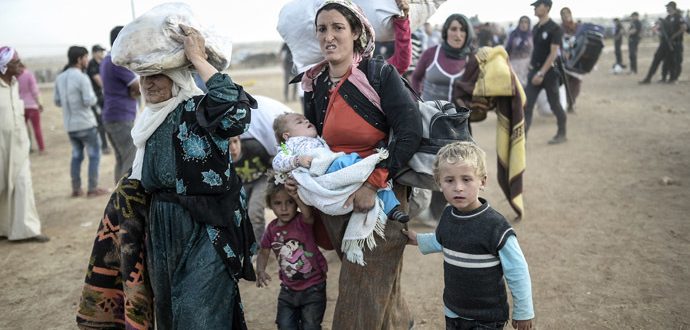Out of nowhere – the Kurds of Syria in peace and war
TransConflict is pleased to present a review of Michael M. Gunter’s “Out of Nowhere. The Kurds of Syria in Peace and War” (London: Hurst and Co., 2014, 169pp.).
| Suggested Reading | Conflict Background | GCCT |
By Rene Wadlow
As negotiations began at the UN’s Palais des Nations in Geneva on 14 March, it is useful to look at who are the negotiation parties present, but also who is not at the table. The Islamic State (ISIS) and the Salafist Jabhat al-Nusra are not there at this stage but their absence will not be regretted by many. More troublesome for the future is the formal absence of the Syrian Kurds.
There are a good number of Kurds in Geneva and informal discussions in restaurants are likely. However, there is no formal Kurdish delegation nor Kurdish representatives as part of the government or opposition delegations. The Kurdish absence is no doubt due to the Turkish government which sees PKK agents in any Kurd around.
While the Kurdish issues in Turkey have attracted international attention, and the largely autonomous Kurdish region of Iraq is a major player in Iraqi politics, the Kurds in Syria have been less studied. Although the Syrian Kurds did not arise “out of nowhere” as the title of this useful book might lead one to think, they have not been as visible factors until now as other ethnic or sectarian groups. As Michael Gunter, a specialist on the Kurdish world, writes “ On 19 July 2012, the previously almost unheard Syrian Kurds suddenly emerged as a potential game changer in the Syrian civil war and what its aftermath might hold for the future in the Middle East when in an attempt to consolidate their increasingly desperate position, government troops were abruptly pulled out of the major Kurdish areas. The Kurds in Syria had suddenly become autonomous, a situation that also gravely affected neighbouring Turkey and the virtually independent Kurdistan Regional Government in Iraq. Indeed, the precipitous rise of the Kurds in Syria bid to become a tipping point that might help change the artificial borders of the Middle East established after the First World War following the notorious Sykes-Picot Agreement.”
In a hope of keeping the Kurds out of the growing armed conflict, shortly after the 15 March 2011 start of the Syrian armed conflict, in April 2011, Bashaar al-Assad had granted Syrian citizenship to some 220,000 Kurds that had been long waiting to be considered as citizens or who had been stripped of their citizenship in a 1962 census. However, armed conflict spread, and the Islamic State started to control territory near Kurdish majority areas. Some observers see the Kurds as “objective allies” of Bashaar as they have many of the same enemies.
Working with the regime has largely saved the Kurdish areas from government bombardment and allowed Kurdish leadership to build alternative forms of government. Gunter discusses in some detail the influence among some Kurdish leaders in Turkey and Syria of the writings of Murray Bookchin (1921-2006) and his views of ecologically-sound autonomous governance − “democratic autonomy”. [1]
During the current “fog of war”, it is difficult to see what forms of cooperation will be developed among the Kurdish areas of Syria, Iraq, Turkey and possibly Iran. There have been talks in Switzerland among Kurdish leaders of the four countries. What is sure, is that the Syrian Kurds will not return to “nowhere”.
Rene Wadlow is President and a Representative to the United Nations, Geneva of the Association of World Citizens.
The views expressed in this article do not necessarily reflect those of TransConflict.
Notes
- See Damian White. Bookchin: A Critical Appraisal (London: Pluto Press, 2008)




















RT @gcct_tc: Out of nowhere – the #Kurds of #Syria in #peace and #war: @TransConflict is pleased to present… https://t.co/n2nGhcq0Wy
Out of nowhere – the Kurds of Syria in peace and war https://t.co/lYbxEqVl8K #Nonprofit
RT @Aktivizmo: Out of nowhere – the Kurds of Syria in peace and war https://t.co/lYbxEqVl8K #Nonprofit
Pingback : "Out of nowhere – the Kurds of Syria in peace and war" - Conflict and Peace Studies - Conflict and Peace Studies
Out of nowhere – the Kurds of Syria in peace and war – TransConflict – https://t.co/cbVkwVJTHX
RT @HamdiHassan1: Out of nowhere – the Kurds of Syria in peace and war – TransConflict – https://t.co/cbVkwVJTHX
RT @HamdiHassan1: Out of nowhere – the Kurds of Syria in peace and war – TransConflict – https://t.co/cbVkwVJTHX